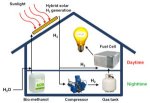Imagine a rooftop solar power system that converts sunlight into hydrogen and stores it in a fuel cell, providing your home with a virtually endless supply of cheap, clean energy. An innovative hybrid system, developed by a young engineer from the USA’s Duke University, does exactly that.
Duke’s Nico Hotz has designed a solar converter that functions in a somewhat similar fashion as a rooftop solar hot water system. Sunlight heats a combination of water and methanol inside a series of vacuum-sealed glass tubes. After two catalytic reactions, Hotz says the system separates hydrogen and delivers it to fuel cell storage much more efficiently than current technology without significant impurities.
“This set-up allows up to 95 percent of the sunlight to be absorbed with very little being lost as heat to the surroundings,” Hotz says. “This is crucial because it permits us to achieve temperatures of well over 200 degrees Celsius within the tubes. By comparison, a standard solar collector can only heat water between 60 and 70 degrees Celsius.”
Inside the system, the water/methanol mix flows through copper tubes coated with a thin layer of aluminium oxide that deliver catalytic nanoparticles to the super-heated liquid. Once evaporated, Hotz says, the resulting hydrogen can flow directly to a fuel cell to be used to provide electricity for a building during the day, or stored in a gas tank for later use.
A paper on Hotz’s work won best paper at the current ASME Energy Sustainability Fuel Cell 2011 conference in Washington, D.C.
Unfortunately, it is still cheaper to use fossil fuels to produce hydrogen (for now), but Hotz has compared his hybrid system to three other solar-based methods and found his to be the cheapest proven way to split the water molecule.
“We performed a cost analysis and found that the hybrid solar-methanol is the least expensive solution considering the total installation costs of $7,900 if designed to fulfill the requirements in summer, although this is still much more expensive than a conventional fossil fuel-fed generator."
Source/image source












































